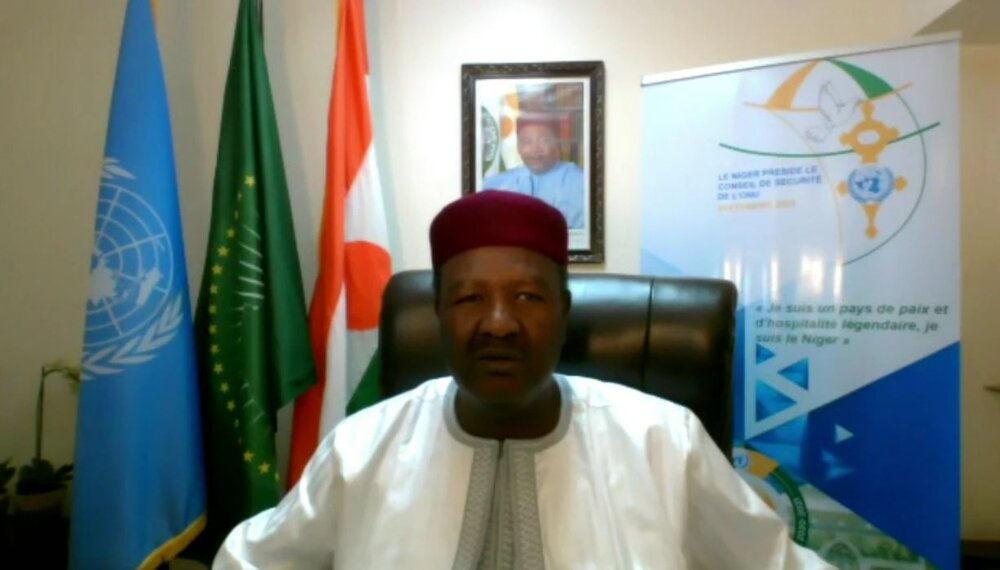Niger rejects U.S. bid to restore UN sanctions on Iran

TEHRAN – In the latest blow to the U.S. push to trigger a snapback of UN sanctions on Iran, Niger, the president of the UN Security Council for September, reaffirmed a rejection of a U.S. complaint against Iran at the Security Council.
On August 20, U.S. Secretary of State Mike Pompeo lodged a complaint with the Council accusing Iran of violating its commitments under a 2015 nuclear deal between Iran and world powers. Pompeo announced that the U.S. has initiated a 30-day process to restore all UN sanctions on Iran. The process, known as the snapback mechanism, faced firm opposition from most UN Security Council member states including Indonesia, the council president for August.
Indonesia UN Ambassador Dian Triansyah Djani said that he, as the Council president, was “not in the position to take further action” because there was “no consensus in the Council.”
Earlier, thirteen of the 15-member UN body rejected what Pompeo called U.S. “notification” to the Council regarding Iran’s compliance with the deal. Most Council’s members said that the U.S. had no legal authority to submit a notification to the UN Security Council and start the snapback process because it withdrew from the nuclear deal on May 8, 2018, and thus it has lost all participants’ rights envisaged in the deal including the right to trigger the return of UN sanctions. However, the U.S. keeps insisting that it has the right to trigger the snapback process, a mechanism built into the 2015 nuclear deal that allows participants to restore international sanctions on Iran in case it breached the deal.
According to the mechanism, if a party to the JCPOA concludes that another party is not complying with its commitments under the agreement, then the complaining party may refer its complaint to the Joint Commission, a body created under the JCPOA to monitor implementation. If a complaint by a non-Iran party is not resolved within 35 days, then the complaining party can notify the Security Council that it believes the complaint constitutes a “significant non-performance”. The Security Council would then have thirty days to adopt a resolution to continue the lifting of sanctions. If such a resolution is not adopted within those thirty days, then the sanctions of all of the pre-JCPOA nuclear-related UN Security Council resolutions would automatically be re-imposed. The U.S. isn’t using this mechanism to re-impose the UN sanctions. Instead, it planned to trigger the snapback by getting around the Joint Commission and directly notifying the Council of a “significant non-performance” by Iran as defined in the UN Security Council Resolution 2231.
During the 30-day process, if no Security Council member submitted a resolution calling for the continuation of the lifting of the UN sanctions on Iran within 10 days of receiving a notification – a measure that would certainly be vetoed by the U.S. -, then the responsibility would fall on the president of the Security Council to introduce such a resolution, which also would certainly be shot down by a U.S. veto.
In light of this legal impasse, Indonesia chose to distance itself from the legal battle by refusing to take further action. Facing a similar situation, Niger also followed in Indonesia’s footsteps, saying it will maintain the position expressed by the former president of the Security Council.
“We’re staying with this decision... that was stated and announced by the president of the Security Council last month,” said Niger’s UN Ambassador Abdou Abarry, ruling out any move to put forward a draft resolution under the snapback process to extend sanctions relief for Iran, according to a Reuters report.
But Abarry said: “Any other member state of the Security Council can do it. The United States can do it.”
Niger took over as the UN Security Council president for September while the U.S.-Iran showdown at the UN reached a critical juncture. Iran and the U.S. are making efforts to gain the support of Niger during its presidency.
On Tuesday, Iranian President Hassan Rouhani held a telephone conversation with his Nigerien counterpart Mahamadou Issoufou in a bid to prevent a “misuse” of the UN Security Council.
“I am confident that the Republic of Niger, as a member of the Non-Aligned Movement, will act completely independently and professionally during its presidency of the UN Security Council and prevent the misuse of the position of the United Nations and the Security Council for American extravagance and unilateralism, just as it took a very constructive stance against the illegal resolution to extend the arms embargo on Iran,” Rouhani told Issoufou, according to a statement carried by the presidential website.
Earlier on August 20, Pompeo met with Abarry to get him on board with the U.S. plan to restore the international restrictions on Iran.
“Good to congratulate Ambassador Abdou Abarry on Niger’s upcoming Presidency of the UN Security Council for September. We look forward to working with Niger as UNSC president to ensure the Council carries UNSC Resolution 2231 and holds Iran accountable for its actions,” tweeted Pompeo on August 20.
Leave a Comment